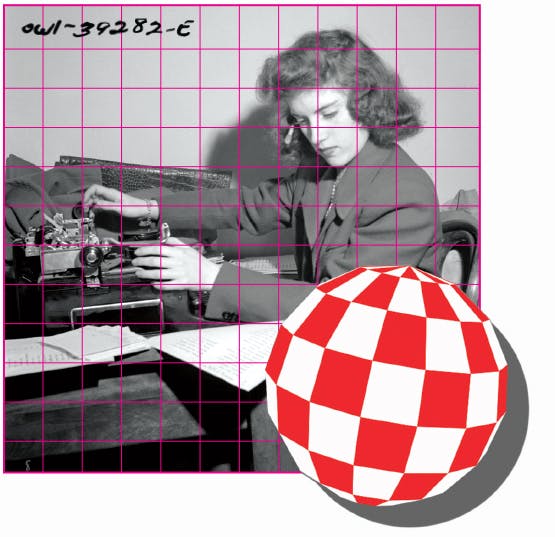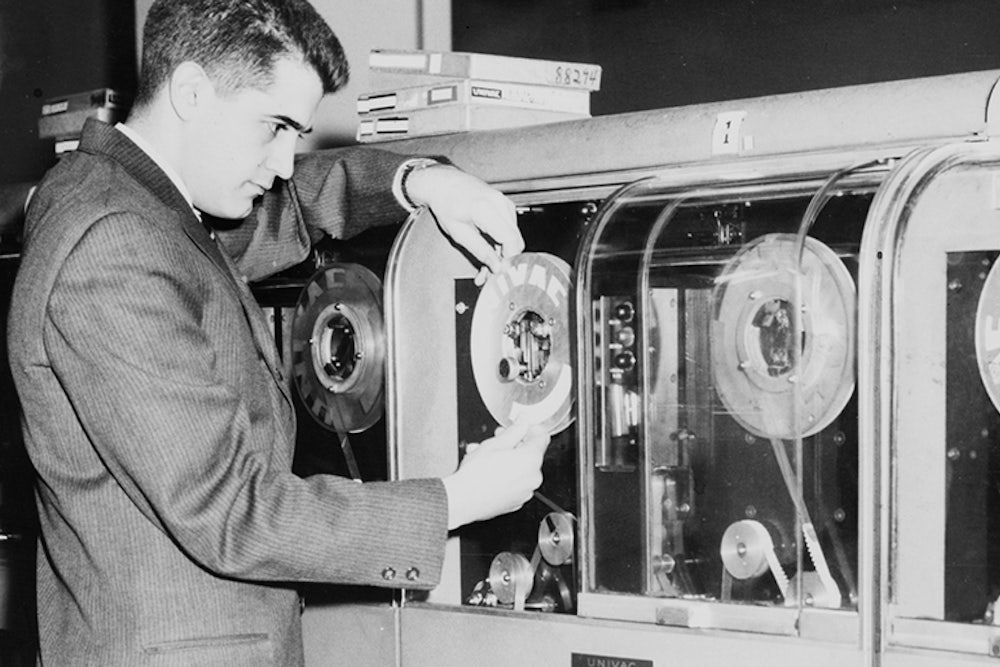Let me tell you how I read: I sit in my apartment with my back to shelves of lovely books, hundreds of carefully chosen books, and I fire up a web browser and go to archive.org, the Internet Archive, which, per its name, is a significant not-for-profit organization dedicated to archiving the world’s knowledge, and I think of a word—say, the word “ornament”—and I search. At which point hundreds of books about “ornament” appear. Most of them are pleasingly filled with pictures.
I sort the results by order of popularity, and start looking through their pages, saving some into folders or posting them to various social networks (Twitter, Facebook, MLKSHK, Tumblr) as I go. This sequence of actions has in many cases replaced the intellectual space I used to allot to reading: explorations of words like “ornament,” or “illustrated,” or “Lincoln,” or “animals”; or for tags like “WWII,” or “haunted.” Archive.org is just the beginning; there are other archives, too. It leaves me calm and satisfied. It is an almost physical relief. I am good for three hours at least.
I planned to read the unread books on my shelves. I bought them with the best intentions. I feel for the authors on the other side of those books. They assumed their thoughts would find some purchase. But now, when I look at all those untouched volumes, where I used to feel guilt and obligation I feel nothing. I am guilty of keeping some volumes simply because they look good on the shelves.
This is not to say I’m done with books and magazines. It’s just that the periods of time in which I used to read them I now often do something else. And I feel weird about it because there is this imagined great battle going on between the codex book and the endless stream of social media. Every time Jonathan Franzen, or someone equally Franzenesque, invokes how much is lost when a person tweets instead of reading a book, the battle lines grow deeper. Social media is on one side, books are on the other. One thing turns us into narcissists; the other makes us thoughtful and empathetic.
So those are the sides: You are either a culture person—a reader—or a social media person, someone consuming vast heaps of memes sprayed directly into your sad eyes by giant companies like Facebook and Twitter.
I tweet with the best of them, and I like reading the hard stuff. I have a phone filled with novels, even some experimental ones. But the reality is that the most profound feeling of cultural participation for me comes from trawling databases. I like to look through old scanned pages, search against tags on Tumblr, see how hashtags form discussion on Twitter, or look through the dead-eyed monstrosity of a racist comment thread on Facebook. That sort of stuff constitutes “reading,” for me.
I particularly like databases of dead media: Places like archive.org, which has millions of books and films and radio programs; or otrrlibrary.org, which archives thousands of old radio shows; or fultonhistory.com, where one man in upstate New York has scanned in over 30 million pages of old newspaper materials. I don’t read for the articles but for the pages: I like the ads, the typography, the feeling of these things, the way they fit together.
The most meaningful experiences I have, the experiences that give me the greatest insight into the operation of culture over time—something over which historians used to hold a monopoly—are the results of database queries. I go in, I search for a term, I click some links, and the resulting stream of options is not even a narrative, just a bag of odds and ends. Then I begin a gentle pawing-through. What I like most is to skim through things that were intended to be transient. The ads, the newsy bits from beekeeping journals, the announcements of 1940s automobiles. You could call me an ephemeralist.
Take, for example, old business magazines from the 1920s. If you look for them online, you will find advertised therein myriad systems for organizing papers. There are, quite literally, pigeonholes for sale. There are articles about sorting documents. And by reading these things, I gain insight into what office life must have been like back then. Then, drifting over to a newspaper article, I’ll search for an address—I’ve been working out of a particular building in New York City, so I looked it up one day and found that this building was once leased by the New York City Department of Welfare. A little more poking around and I determined, via some basic mathematics, that while we have room for 100 people working here now, back then there were 300 people on this floor.
One night, after everyone went home, I walked around and mentally removed the bathrooms, the spare closets, the glassed-in conference rooms, and imagined where the desks had gone, and how people would have had to work in shifts, and realized that nearly 100 years ago as many as 600 people might have come through here each day. I could not find any photos of the space in the early 1900s, but I found similar photos from the city archives, photos of people amid great big piles of papers. Rubber-stamp kind of stuff. It was an age of gray-collar tabulation whereas today we are in an age of white-collar computation. There must have been so much work.
As an ephemeralist, the past is always around me. Now, every time I hit a button in the elevator in my office building, I imagine what it was like here in a different era, the way people must have smelled and the things they would have said. I think about how the elevators seem awfully crowded some days, but what would that have been like with three times the people here? On the way to my floor, the doors open on co-working spaces with speedy wireless, and young people get on and off.
There is so much past available, so cheaply, especially the past of cities. There are thousands of photographs of old New York sitting in databases ready to be searched and found. The images themselves are basically free from meaning. Books have edges and boundaries; thumbnails of old photos do not. It’s up to the finder what to make of them. That so many of these databases end up being used to trace genealogy makes sense: One of the fundamental questions that preoccupy humans is, “Where did I come from?”

That question interests me as well, but in a broader sense, not related to genetics but to language, culture, the choices people make about pants and hairstyles. I grew up in a college town, and one thing I always loved doing was looking through copies of The Serpentine—that was the name of the yearbook—and observing the change in culture as the years went on. The 1920s were all serious faces: Everyone looked like they were 40 years old, even though they were 19. You can start to see the idea of college take hold in the 1930s, the notion of self-discovery instead of just training in a discipline. And then, in the 1950s and 1960s, everyone became a sort of miniature adult: The young men were photographed next to their convertibles; there were pipes. The women spent great time on their hair. Then the late ’60s came and with it a complete explosion, of drugs, swirling magic-marker sketches, everyone gone blousy, song lyrics scrawled into yearbook pages. In the 1990s, the effects of desktop publishing were starting to be felt, and, as a result, any hint of childishness vanished. Everything began to look so professional.
The meaning of reading this way doesn’t land quickly, and sometimes it doesn’t land at all. It is ephemeralism for the purest pleasure of it. There is no ethical lesson, no particular sympathy to be gained for a subject. There’s no moral, no beginning, no ending, and very little tragedy. Only change. On old radio shows you can hear the way that voices sounded, the way vowels sounded; in old magazines you can see lithography take over whole pages that previously had been composed of pure type, and then yield to photographs. You can bathe in a world of type specimens, museum catalogs, comical narratives about aeroplanes, jest-books, and so forth. It is glorious: lovely to read and accessible, subtle, full of mystery, often hilarious.
Books and web sites are both always begging for attention. But that is the best thing about ephemeralism: There isn’t a marketing message, nothing that you must read. There’s just an endless collection of stuff, its urgency long-fed. Ephemeralist reading is halfway between the collective pleasures of a social network and the solitary ones of a book. You just drift, occasionally sharing, not creating meaning and not worrying about any of it.
The lesson of that kind of reading is a simple one. It has taught me that my own life is ephemeral. Despite all the heroic myths about the unique, irreplaceable preciousness of our daily lives, I am absolutely convinced that someone, someday 50 or 100 years from now, will be working at a computer near where I am seated right now, and he or she will come across the address of my office mentioned in this article—902 Broadway—and will read with amusement or wonder or puzzlement about my experiences. I greet you, and the people who follow you, and the ones after them, and I hope that I give you a moment’s satisfaction, and that you take as much pleasure from your search as I did.
